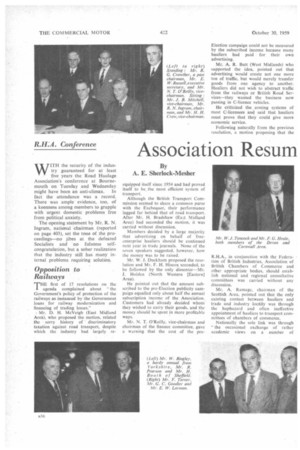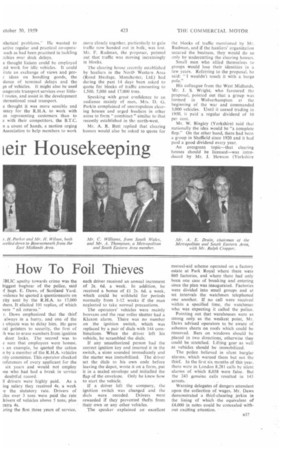Association Resum
Page 70

Page 71

Page 72

If you've noticed an error in this article please click here to report it so we can fix it.
[eh Housekeeping WITH the security of the industry guaranteed for at least
• five years the Road Haulage Association's conference at Bournemouth on Tuesday and Wednesday might have been an anti-climax. In fact the attendance was a record. There was ample evidence, too, of a keenness among members to grapple with urgent domestic problems free from political anxiety.
The opening statement by Mr. R. N. Ingram, national chairman (reported on page 403), set the tone of the proceedings—no jibes at the defeated Socialists and no fulsome selfcongratulation, but a sober realization that the industry still has many internal problems requiring solution.
Opposition to Railways
THE first of 17 resolutions on the agenda complained about " the Government's policy of protection of the railways as instanced by the Government loans for railway modernization and financing of trading losses."
. Mr. D. H. McVeigh (East Midland Area), who proposed the motion, related the sorry history of ' discriminatory taxation against road transport, despite which the industry had largely re equipped itself since 1954 and had proved itself to be, the most efficient system of transport.
Although the British Transport Commission seemed to share a Common purse with the Exchequer, their performance lagged far behind that of road transport. After Mr. H. Bradshaw (East Midland Area) had seconded the motion, it was carried without discussion.
Members decided by a large majority that advertising on behalf of freeenterprise hauliers should be continued next year in trade journals. None of the seven speakers suggested. however, how the money was to be raised.
Mr. W. J. Duckham proposed the resolution and Mr. F. H. Hiscox seconded, to be followed by the only dissenter—Mr. I. Holden (North Western [Eastern] Area).
He pointed out that the amount subscribed to the pre-Election publicity campaign equalled only about half the annual subscription income of the Association. Customers had already decided whom' they wished to carry their goods, and the money should be spent in more profitable ways.
Mr. N. T. O'Reilly, vice-chairman and chairman of the finance committee, gave a warning that the cost of the pre
R.H.A., in conjunction with the Federation of British Industries, Association of British Chambers of Commerce and other appropriate bodies, should establish national and regional consultative committees was carried without any discussion.
Mr. A. Ramage, chairman of the Scottish Area, pointed out that the only existing contact between hauliers and trade and industry locally was through the haphazard and often ineffective appointment of hauliers to transport committees of chambers of commerce.
Nationally the sole link was through " the occasional exchange of rather academic views on a number of
[HOD, but a motion to this effect was lost. Mr. A. J. Dale (West Midlands) suggested instead that clearing houses should be registered by an approval committee formed by the R.H.A., perhaps with the co-operation of other bodies. This amendment was thrown out on a recount by four votes.
Mr. Hewson agreed that good clearing houses were necessary, but complained that bucket shops had grown up all over the country and hauliers were entitled to protection against them. Many of these organizations exacted more than 10-per-cent. commission and took a year to pay, and then perhaps only after repeated demands and threats. Still worse were the houses that were closed after a few months without paying.at all.
Perhaps Mr. Rudman put, his finger on the spot when he said that if licensing were introduced, every existing clearing house would have to be granted a licence and a protection ring would be formed for those very organizations of which hauliers were complaining.
Mr. J. W. Ellis (Metropolitan and South-Eastern Area), a former chairman of the National Conference of Road Transport Clearing Houses, was in favour of registration of clearing houses by the Licensing Authorities.
High-speed Session
DURING a high-speed session on Tuesday afternoon, six resolutions were passed without discussion. One was that fares to and from work should be allowable against income tax. Another was that all obstructions, such as trees and lighting standards, should be removed from the verges of trunk roads.
A third called for the use by the Ministry of Transport only of weighing machines accommodating two wheels of a vehicle instead of one. Delegates agreed that oil-fuel records were an unreasonable responsibility.
A hardy annual also accepted without debate urged that employers should not be guilty of an offence if they had done everything possible to prevent breaches of the law on drivers' hours and records. The Ministry were also urged to enforce the regulations governing C-hiring to ensure that drivers were properly employed by the licence-holder.
Delegates decided against the use of parking meters to speed up the flow of traffic, as proposed by Mr. Ralph Cropper (Metropolitan and South Eastern), but decided instead that parking sites should be provided. Mr. C. Collins (West Midlands) was responsible for the amendment, backed by Mr. L. R. Robson (Southern Area).
A proposal expressing dissatisfaction with the knock-for-knock agreement practised by -insurance companies was lost after Mr. L. A. Bennett, chairman of the insurance panel of the National Road Transport Federation, had pointed out that if the system were abandoned, premiums might have to be doubled because of the high cost of litigation.
a38 There would also be delay in repairing vehicles. Mr. A. C. W. Neely (West Midlands) who proposed the motion, complained bitterly of the disparity between insurance premiums on Aand C-licence vehicles.
Although they undoubtedly did not understand the implications, delegates carried by a majority a resolution urging the Association to press for a new system of vehicle taxation based on maximum gross weights of goods vehicles, as determined by the manufacturers.
The proposer, Mr. T. Weatherhogg (West Midlands), who complained that his original resolution had been mutilated, suggested that every prototype vehicle should be submitted to the Ministry for certification. It should be tested with a 50-per-cent. overload. He thought taxation on gross weight would promote safety and prevent overloading.
A resolution deploring the interpretation placed on the phrase " normal user" and urging that the position of A-licence holders originally established under the 1933 Act should be restored, was carried after a sketchy discussion. The importance of the subject deserved a better fate. Mr. Collins said that exaggerated use was being made of Section 9 (4) of the 1953 Act by fanatical Licensing Authorities.
Mr. A. R. Butt was not so convinced.
He said that there had been no unanimity, even among members of the R.H.A. licensing committee on the question of whether A-licence vehicles should be allowed to carry any traffic anywhere. Some thought normal user was a protection.
Mr. I. H. Male (West Midlands) was all in favour of freedom, but thought that hauliers should make greater use of their power of objection. Mr. R. A. C. Smith (North West [Western] Area) called for greater uniformity of opinion on normal user by the Authorities.
By a majority, delegates decided against a system under which applicants• and objectors in cases concerning new or extended carriers' licences should be required to pay a deposit to the Authority and forfeit part of it if the application proved to be frivolous or vexatious, or if the objector failed without good reason to appear at the inquiry.
• Mr. Percy May (Metropolitan and South Eastern Area) proposed the motion. Mr. J. H. G. Penfold, also from the Metropolis, who supported Mr. May, said he had spent more than £100 on appearances as an objector in cases in which the applicants had failed to appear.
Mr. A. J. Dale wanted a complete inquiry into the licensing system. Without discussing the matter, delegates threw out a plea that statutory attendants should be unnecessary on a vehicle and trailer outfit in which the trailer had twinline air brakes and emergency stop valves or automatic braking devices.
Biggest Swindle"
THE conference was brought to a stimulating and hilarious climax on Wednesday by a Brains Trust headed by Mr. Freddie Grisewood. The members were Mr. Mark Hewitson, Lab. M.P. for Hull West, Mr. Charles Curran, the new Conservative M.P. for Uxbridge, Mr. Dominic le Foe, a Liberal sympathizer, and Mr. Hugo O'Hear, "a reluctant Tory."
Replying to Mr. .1 S. Wright, who asked whether the amount spent on the roads should bear a closer relationship to the sum collected in taxes from road users, Mr. O'Hear said that motor taxation was the biggest swindle ever perpetrated. The roads must match the country's production.
Mr. Hewitson favoured a national road board with powers of compulsory acquisition of land. The bulk of the country's production could, he said, be carried by road if the roads were provided.
Mr. Curran replied that it was nonsense to say that all vehicle taxation should be devoted to the roads. "You can't get something for nothing even if you call if nationalization," he 'commented.
Support for Industry
QPEAKING at the Association's dinner on Wednesday, Mr. R. N. Ingram. national chairman, expressed gratification at the widespread support accorded to the road haulage industry during the Election campaign. Hauliers had received sympathy and often active support from their own workers, as well as from practically the whole of trade and industry. Representatives of the British Transport Commission, of the Labour Party and road haulage workers had, in conversation with him, hinted or even expressly stated that they had no wish to see the industry renationalized, but some of them were bound to follow the party line.
Mr. Ingram said that the R.H.A. would do everything possible to correct such faults as had been found in the industry. Referring to congestion in large towns. he' said that hauliers were playing their part in solving the problem by ensuring that the maximum use was made of their vehicles.
The Association had no intention of inflicting a rigid system of charges on trade and industry, hut they said that there were minimum rates below which it was impossible for a haulage business to remain healthy.
The need to take united action against an external threat had given the industry an increasing awareness of itself. The Association's task for the future was to foster this consciousness of the importance of the industry.




















































































































